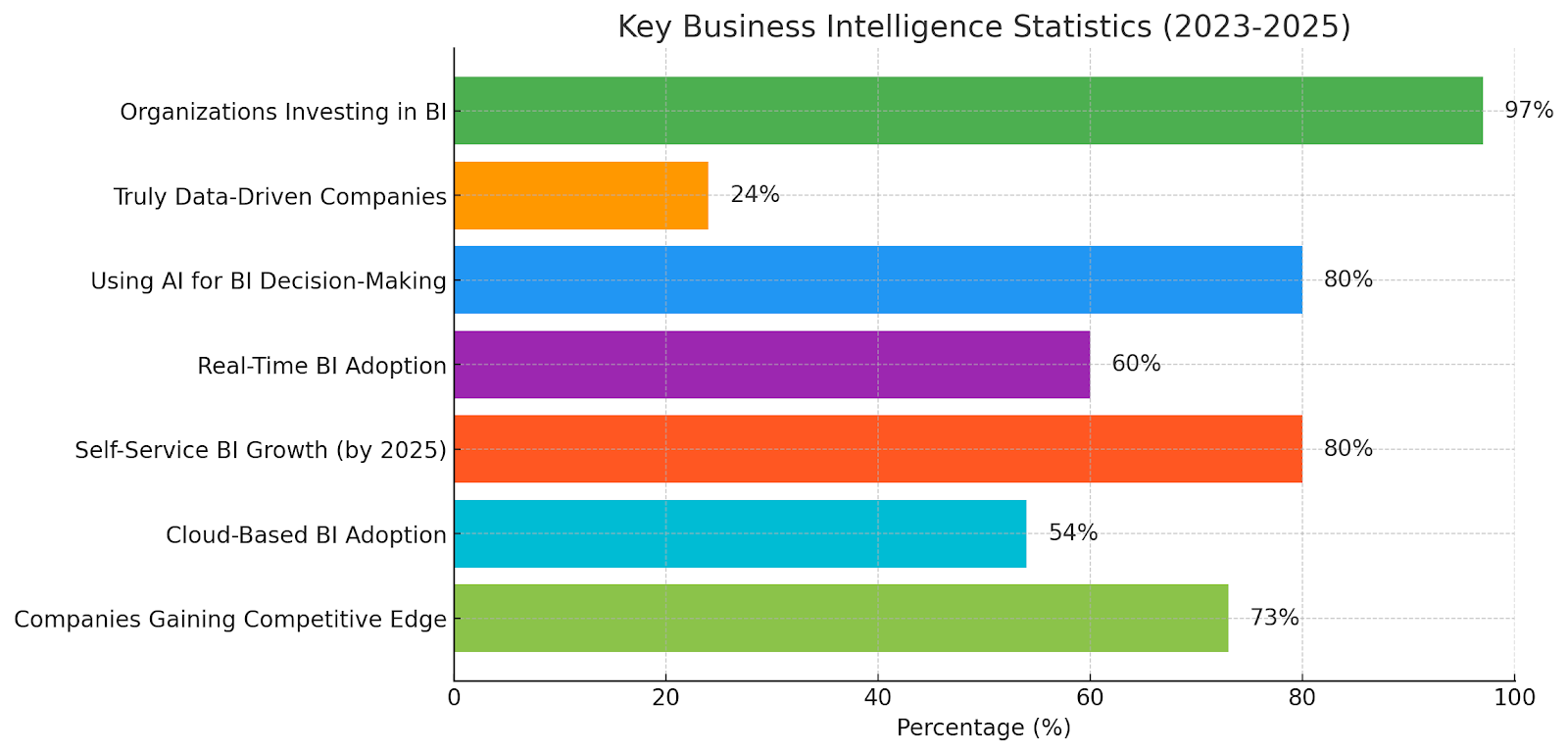

The Future of Business Intelligence Analysis in Business
Published: 2025-01-20 06:31:02
Business Intelligence (BI) has emerged as a cornerstone of modern business operations. As organizations navigate a landscape defined by rapid technological advancements and dynamic market demands, the role of Business Intelligence has become indispensable. This article explores the future of Business Intelligence analysis, its transformative potential, and its impact on business strategies.
The Evolution of Business Intelligence
Business Intelligence has come a long way from traditional reporting and data visualization tools. Initially, BI systems were limited to collecting historical data and generating static reports. However, the advent of advanced analytics, machine learning, and artificial intelligence has revolutionized Business Intelligence, enabling predictive and prescriptive insights.
Today, Business Intelligence is no longer confined to data experts. Self-service BI tools empower non-technical users to analyze data and derive actionable insights. This democratization of data analytics has increased its accessibility across various business functions, from marketing and sales to finance and operations.
Key Business Intelligence Statistics:
- Adoption Rate:
- 97% of organizations are investing in data analytics and Business Intelligence. (Gartner)
- However, only 24% consider themselves truly data-driven. (Forrester Research)
- Market Growth:
- The global Business Intelligence market is expected to reach $43.03 billion by 2028, growing at a CAGR of 8.7%. (Fortune Business Insights, 2023)
- AI & BI Integration:
- 80% of business leaders say AI-powered BI tools are critical for data-driven decision-making. (Dresner Advisory Services, 2023)
- Companies using AI-enhanced BI experience up to 40% faster decision-making. (McKinsey)
- Real-Time Analytics Usage:
- 60% of enterprises are leveraging real-time Business Intelligence for operational efficiency. (IDC, 2023)
- Self-Service BI Growth:
- By 2025, 80% of data analytics initiatives will be driven by non-technical business users using self-service BI tools. (Gartner)
- Data Visualization & Storytelling:
- 67% of executives believe data visualization and storytelling are crucial for effective communication of insights. (BI-Survey, 2023)
- Cloud-Based BI Adoption:
- 54% of businesses now use cloud-based BI platforms, and this number is growing rapidly. (Statista, 2023)
- Competitive Advantage:
- 73% of businesses using BI tools say they have gained a competitive edge in their industry. (Deloitte Insights)

- 97% of organizations are investing in BI and analytics to enhance decision-making.
- Only 24% of companies describe themselves as truly data-driven.
- 80% of businesses are integrating AI into their BI decision-making processes.
- 60% of enterprises are adopting real-time analytics for better responsiveness.
- The self-service BI market is projected to grow by 80% by 2025.
- 54% of companies have transitioned to cloud-based BI solutions.
- 73% of businesses believe BI gives them a competitive advantage.
Emerging Trends in Business Intelligence
The future of Business Intelligence is being shaped by several key trends. These trends are transforming how businesses leverage data to drive decision-making and achieve competitive advantages:
1. Artificial Intelligence and Machine Learning Integration
AI and machine learning are redefining Business Intelligence by enabling systems to learn from data and identify patterns that humans might overlook. Automated data analysis, anomaly detection, and predictive modeling are becoming standard features in modern BI tools. This integration enhances decision-making by providing more accurate forecasts and deeper insights.
2. Real-Time Analytics
In today’s fast-paced business environment, the ability to make decisions in real time is critical. Real-time analytics allows businesses to respond swiftly to market changes, customer behavior, and operational challenges. With the growing adoption of IoT and edge computing, real-time data processing is set to become a cornerstone of Business Intelligence.
3. Natural Language Processing (NLP)
NLP is making Business Intelligence more user-friendly by allowing users to interact with BI systems using natural language queries. This technology bridges the gap between data and decision-makers, enabling intuitive data exploration and reducing reliance on technical expertise.
4. Data Visualization and Storytelling
Effective communication of insights is a vital aspect of Business Intelligence. Advanced data visualization tools and storytelling techniques are enabling businesses to present complex data in a more digestible and engaging manner. Interactive dashboards and visual narratives are becoming essential for conveying the significance of data-driven insights.
5. Cloud-Based Business Intelligence
Cloud computing is revolutionizing the way businesses access and analyze data. Cloud-based BI solutions offer scalability, cost-effectiveness, and seamless collaboration. As businesses increasingly adopt hybrid and remote work models, cloud-based BI platforms are expected to dominate the market.
6. Enhanced Data Governance and Security
With the growing emphasis on data privacy and compliance, robust data governance practices are critical. The future of Business Intelligence will see greater investments in data security, ensuring that sensitive information is protected while maintaining transparency and compliance with regulations.
The Impact of Business Intelligence on Business Strategies
The integration of Business Intelligence into business strategies is reshaping how organizations operate and compete. Here are some ways BI is driving transformation across industries:

1. Data-Driven Decision-Making
Business Intelligence enables organizations to base their decisions on data rather than intuition. By analyzing historical trends and current data, businesses can make informed choices that align with their objectives and market conditions.
2. Enhanced Customer Experience
BI tools help businesses understand customer preferences and behaviors. By analyzing customer data, companies can personalize experiences, improve service delivery, and build stronger relationships. Predictive analytics also allows businesses to anticipate customer needs and stay ahead of competitors.
3. Operational Efficiency
Business Intelligence streamlines operations by identifying inefficiencies and areas for improvement. Real-time analytics helps businesses monitor performance and optimize processes, leading to cost savings and increased productivity.
4. Competitive Advantage
In a competitive market, the ability to harness data effectively can set a business apart. BI provides insights into market trends, competitor performance, and emerging opportunities, enabling organizations to develop strategies that give them an edge.
5. Strategic Planning and Forecasting
Business Intelligence plays a pivotal role in strategic planning by providing accurate forecasts and scenario analysis. This capability allows businesses to anticipate challenges and prepare for future opportunities, ensuring long-term sustainability.
Challenges and Considerations for the Future of Business Intelligence
While the future of Business Intelligence is promising, there are challenges that organizations must address to fully realize its potential:
1. Data Quality and Integration
The effectiveness of Business Intelligence depends on the quality of data. Ensuring accurate, consistent, and integrated data from multiple sources is a significant challenge. Businesses need robust data management practices to overcome this hurdle.
2. Skill Gaps
Despite advancements in self-service BI tools, there is still a need for skilled professionals who can interpret complex data and generate insights. Organizations must invest in training and upskilling their workforce to maximize the benefits of Business Intelligence.
3. Cost and Scalability
Implementing and maintaining BI systems can be costly, especially for small and medium-sized enterprises. Ensuring scalability and cost-effectiveness is essential for broader adoption of Business Intelligence.
4. Ethical and Privacy Concerns
As data collection becomes more pervasive, ethical and privacy concerns are growing. Businesses must navigate these issues carefully to maintain customer trust and comply with regulations such as GDPR and CCPA.
The Role of Business Intelligence in Emerging Technologies
The future of Business Intelligence is closely tied to the evolution of emerging technologies. Here are some technologies that are expected to drive BI advancements:
1. Blockchain
Blockchain technology can enhance data security and transparency in Business Intelligence. By providing immutable records and secure transactions, blockchain can improve the reliability of BI systems.
2. Augmented Reality (AR) and Virtual Reality (VR)
AR and VR technologies are expanding the possibilities for data visualization in Business Intelligence. These immersive tools allow users to interact with data in 3D environments, making insights more tangible and actionable.
3. Quantum Computing
Quantum computing has the potential to revolutionize Business Intelligence by processing massive datasets at unprecedented speeds. This capability will unlock new levels of analytics and predictive modeling.
Preparing for the Future of Business Intelligence
To capitalize on the opportunities presented by Business Intelligence, organizations must adopt a proactive approach. Here are some strategies for preparing for the future of BI:

1. Invest in Advanced BI Tools
Businesses should invest in cutting-edge BI tools that incorporate AI, machine learning, and NLP capabilities. These tools will provide a competitive edge by delivering deeper insights and automating complex analyses.
2. Foster a Data-Driven Culture
Creating a culture that values data-driven decision-making is essential. This involves educating employees about the importance of Business Intelligence and providing them with the tools and training needed to leverage data effectively.
3. Prioritize Data Governance
Strong data governance practices ensure the accuracy, security, and ethical use of data. Organizations must establish clear policies and frameworks to manage data effectively.
4. Collaborate with Experts
Partnering with BI experts and consultants can help businesses navigate the complexities of implementing and optimizing BI systems. External expertise can provide valuable insights and best practices.
5. Stay Agile and Adaptable
The field of Business Intelligence is constantly evolving. Businesses must remain agile and adaptable to embrace new technologies and methodologies as they emerge.
Strategies for Successful Business Intelligence Analysis in India
India's rapidly growing digital economy and data-driven business landscape make Business Intelligence (BI) a game-changer for enterprises across industries. With the rise of AI-driven analytics, cloud-based solutions, and government initiatives like Digital India, businesses must adopt strategic approaches to harness the power of BI effectively. Here are key strategies tailored for Indian businesses:
1. Data-Driven Decision-Making Culture
Organizations in India must shift from intuition-based decisions to a data-driven culture. Investing in BI tools like Power BI, Tableau, and Google Data Studio allows businesses to leverage real-time insights for smarter decision-making.
2. Integration of AI and Machine Learning
Indian companies are increasingly integrating AI and ML into BI systems to improve predictive analytics. Businesses in e-commerce, fintech, and healthcare are using AI-driven BI to enhance customer personalization and fraud detection.
3. Cloud-Based BI for Scalability
With India's cloud adoption growing rapidly, businesses are migrating to AWS, Google Cloud, and Microsoft Azure for BI solutions. Cloud-based BI ensures scalability, cost efficiency, and remote accessibility, making it ideal for startups and enterprises.
4. Industry-Specific BI Applications
- Retail & E-commerce: BI tools analyze consumer behavior to optimize pricing and inventory.
- Finance & Banking: BI enhances risk assessment, fraud detection, and customer segmentation.
- Healthcare: Hospitals use BI to improve patient management and operational efficiency.
- Manufacturing: BI helps track supply chain performance and optimize production.
5. Localization and Language Adaptation
To cater to India's diverse consumer base, businesses should use BI tools that support multilingual data visualization. Implementing NLP-based BI dashboards in regional languages enhances accessibility for decision-makers at all levels.
6. Compliance with Data Regulations
With India’s evolving Data Protection Laws and compliance frameworks like ISO 27001, businesses must implement robust data governance strategies to ensure security, privacy, and compliance.
7. Real-Time Analytics for Competitive Advantage
Indian businesses need real-time BI for quick decision-making in sectors like stock markets, online retail, and digital payments. Live dashboards and real-time reporting improve operational agility.
8. Upskilling Workforce for BI Adoption
The lack of skilled professionals in BI and analytics is a major challenge. Companies must invest in employee training programs, partnerships with ed-tech platforms, and in-house BI training to maximize the benefits of data analytics.
By leveraging AI, cloud computing, and real-time analytics while ensuring data security and compliance, companies can unlock data-driven success in India’s competitive market. 🚀
Explore further for more details.
Top Applications of Machine Learning in Video Game Development
Machine Learning Career Opportunities: Exploring Roles and Growth Prospects
How to Become a Successful Business Intelligence Analyst
Summary
The future of Business Intelligence holds immense potential for transforming how businesses operate and compete. By harnessing advanced analytics, real-time data processing, and emerging technologies, organizations can unlock new levels of efficiency, innovation, and customer satisfaction. However, realizing the full potential of Business Intelligence requires addressing challenges such as data quality, skill gaps, and ethical concerns. As businesses continue to prioritize data-driven strategies, Business Intelligence will remain at the forefront of innovation and success in the ever-evolving business landscape.
FAQs:
1. What is Business Intelligence (BI)?
Business Intelligence (BI) refers to technologies and tools that help organizations analyze data to make informed decisions. It involves using data analytics, reporting, and visualization to uncover insights and improve business performance.
2. What are Business Intelligence Tools?
BI tools are software used to collect, analyze, and present data. They include platforms like Tableau, Power BI, and QlikView, which help businesses visualize trends, generate reports, and make data-driven decisions.
3. How Does Business Intelligence (BI) Work?
BI works by gathering data from various sources, analyzing it, and presenting insights through dashboards and reports, enabling businesses to make better, informed decisions.
4. What are the Benefits of Business Intelligence?
- Better Decision-Making: BI enables data-driven decisions.
- Improved Efficiency: Automates reporting and analysis.
- Increased Revenue: Identifies new opportunities.
- Competitive Advantage: Helps businesses stay ahead.
- Customer Insights: Enhances understanding of customer behavior.
- Cost Reduction: Identifies inefficiencies and reduces costs.


